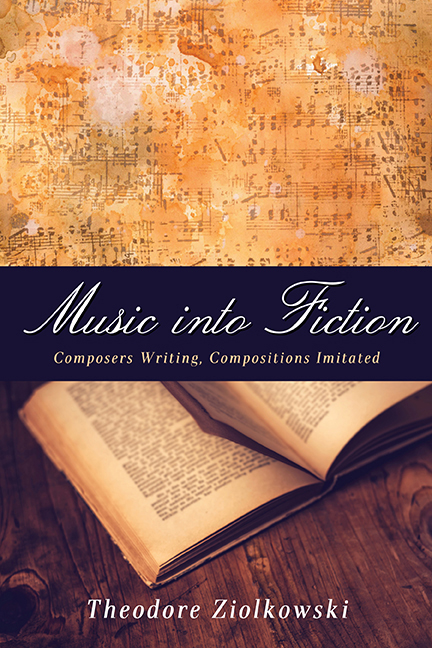Finale: Composers Setting Fictional Compositions
Published online by Cambridge University Press: 09 May 2017
Summary
Literary works have frequently been adapted to music in various forms. Program music, which is sometimes also called musical ekphrasis, embraces many familiar compositions based on literary works: from Schumann's Davidsbündlertänze, Berlioz's Harold en Italie, and Tchaikovsky's Manfred to the efforts by many composers to render the theme of Faust musically: Liszt in his Zwei Episoden aus Lenaus Faust, Wagner in his Faust-Ouvertüre, and Berlioz in his Damnation de Faust. In 1955, at the suggestion of Michel Foucault, the French serialist Jean Barraqué (1928–73) undertook the bold challenge of representing Hermann Broch's La mort de Virgile as a vast symphonic cycle, but completed only two sections of the projected thirteen parts: Le temps restitué, a work for soprano, chorus, and orchestra; and Chant après chant for percussion, piano, and voice.
The standard Lieder repertoire features hundreds of settings of poetic works, ranging from Schubert's Die schöne Müllerin and Winterreise (both by Wilhelm Müller) by way of Schumann's Dichterliebe (on poems by Heinrich Heine) and Wagner's Wesendonck-Lieder to Gustav Mahler's Lied von der Erde (from Hans Bettge's translation of Chinese poetry) and Richard Strauss's Vier letzte Lieder (on poems by Joseph von Eichendorff and Hermann Hesse). And apart from the relatively few examples of libretti written by the composer himself, as we have seen, most operas are based on well-known dramatic texts: for instance, the classical dramas used by Gluck (Iphigénie en Aulide, Iphigénie en Tauride) and the plays by Schiller favored by Rossini (Guillaume Tell) and Verdi (Don Carlos) to the Pushkin adapted by Tchaikovsky (Eugene Onegin), the Maeterlinck underlying Debussy's Pelléas et Mélisande, and the tales by Melville (Billy Budd) and Thomas Mann (Death in Venice) used by Benjamin Britten.
But what occurs rarely is the effort of composers to re-create musically compositions described in a literary work. The example to be discussed in the following chapter is so unusual, if not unique, that it deserves a separate treatment in the context of our present considerations.
- Type
- Chapter
- Information
- Music into FictionComposers Writing, Compositions Imitated, pp. 197 - 198Publisher: Boydell & BrewerPrint publication year: 2017

